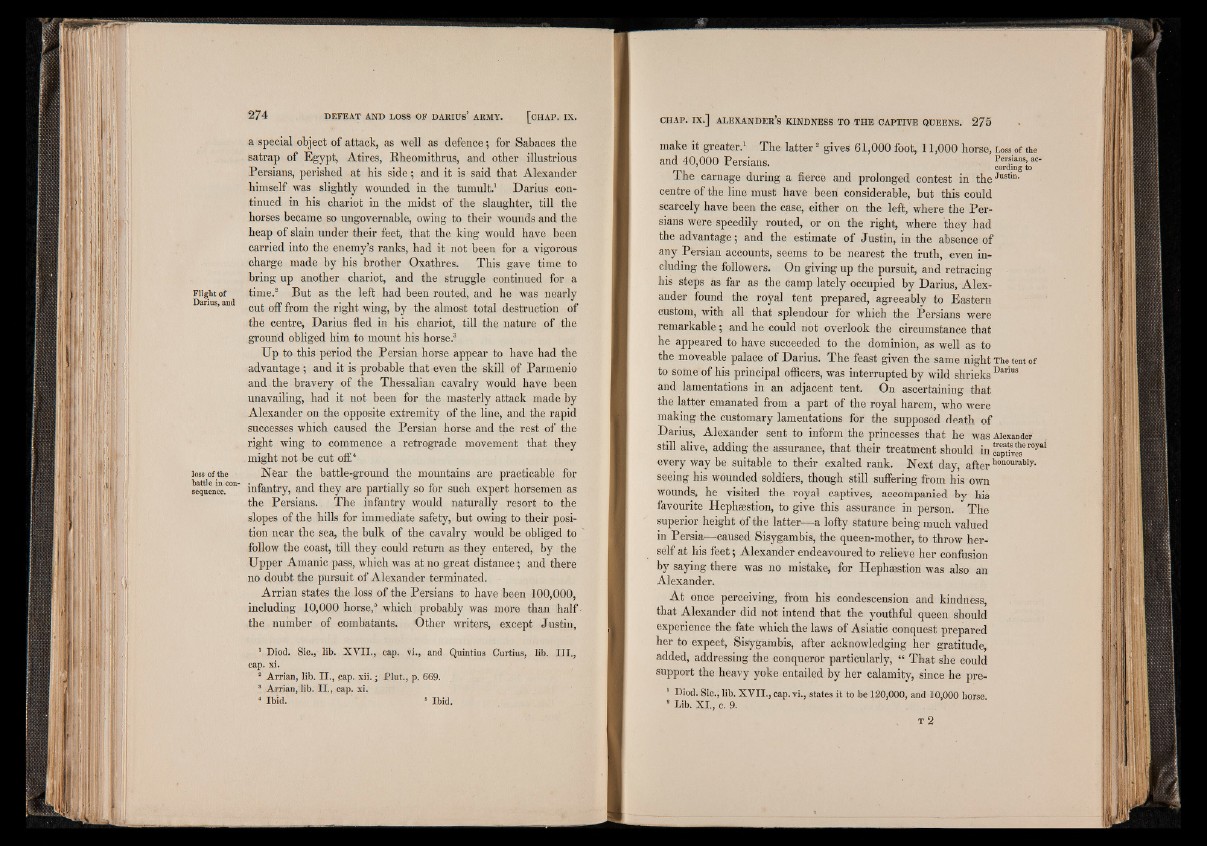
a special object of attack, as well as defence; for Sabaces the
satrap of Egypt, Atires, Rheomithrus, and other illustrious
Persians, perished at his side; and it is said that Alexander
himself was slightly wounded in the tumult.1 Darius continued
in his chariot in the midst of the slaughter, till the
horses became so ungovernable, owing to their wounds and the
heap of slain under their feet, that the king would have been
carried into the enemy’s ranks, had it not been for a vigorous
charge made by his brother Oxathres. This gave time to
bring up another chariot, and the struggle continued for a
Flight of time.2 But as the left had been routed, and he was nearly
anus, an ^ Qg' prom tjjg rigbt wing, by the almost total destruction of
the centre, Darius fled in his chariot, till the nature of the
ground obliged him to mount his horse.3
Up to this period the Persian horse appear to have had the
advantage; and it is probable that even the skill of Parmenio
and the bravery of the Thessalian cavalry would have been
unavailing, had it not been for the masterly attack made by
Alexander on the opposite extremity of the line, and the rapid
successes which caused the Persian horse and the rest of the
right wing to commence a retrograde movement that they
might not be cut off.4
loss of the Near the battle-ground the mountains are practicable for
sequence.0011" infantry, and they are partially so for such expert horsemen as
the Persians. The infantry would naturally resort to the
slopes of the hills for immediate safety, but owing to their position
near the sea, the bulk of the cavalry would be obliged to
follow the coast, till they could return as they entered, by the
Upper Amanic pass, which was at no great distance; and there
no doubt the pursuit of Alexander terminated.
Arrian states the loss of the Persians to have been 100,000,
including 10,000 horse,5 which probably was more than half-
the number of combatants. Other writers, except Justin,
1 Diod. Sic., lib. X V II., cap. vi., and Quintius Curtius, lib. I I I .,
cap. xi.
3 Arrian, lib. I I ., cap. x ii.; Plut., p. 669.
3 Arrian, lib. I I ., cap. xi.
4 Ibid. 5 Ibid.
make it greater.1 The latter2 gives 61,000 foot, 11,000 horse, Loss of the
and 40,000 Persians. Persians ac-
% cording to
The carnage during a fierce and prolonged contest in theJustin-
centre of the line must have been considerable, but this could
scarcely have been the case, either on the left, where the Persians
were speedily routed, or on the right, where they had
the advantage; and the estimate of Justin, in the absence of
any Persian accounts, seems to be nearest the truth, even including
the followers. On giving up the pursuit, and retracing
his steps as far as the camp lately occupied by Darius, Alexander
found the royal tent prepared, agreeably to Eastern
custom, with all that splendour for which the Persians were
remarkable; and he could not overlook the circumstance that
he appeared to have succeeded to the dominion, as well as to
the moveable palace of Darius. The feast given the same night The tent of
to some of his principal officers, was interrupted by wild shrieks Darius
and lamentations in an adjacent tent. On ascertaining that
the latter emanated from a part of the royal harem, who were
making the customary lamentations for the supposed death of
Darius, Alexander sent to inform the princesses that he was Alexander
still alive, adding the assurance, that their treatment should in rapto*6™7“*
every way be suitable to their exalted rank. Next day, after honourabIy-
seeing his wounded soldiers, though still suffering from his own
wounds, he visited the royal captives, accompanied by his
favourite Hephsestion, to give this assurance in person. The
superior height of the latter—a lofty stature being much valued
in Persia—-caused Sisygambis, the queen-mother, to throw herself
at his feet; Alexander endeavoured to relieve her confusion
by saying there was no mistake, for Hephaestion was also an
Alexander.
At once perceiving, from his condescension and kindness,
that Alexander did not intend that the youthful queen should
experience the fate which the laws of Asiatic conquest prepared
her to expect, Sisygambis, after acknowledging her gratitude,
added, addressing the conqueror particularly, “ That she could
support the heavy yoke entailed by her calamity, since he pre-
1 Diod. Sic., lib. X V II., cap. vi., states it to be 120,000, and 10,000 horse
2 Lib. X I., c. 9.
T 2